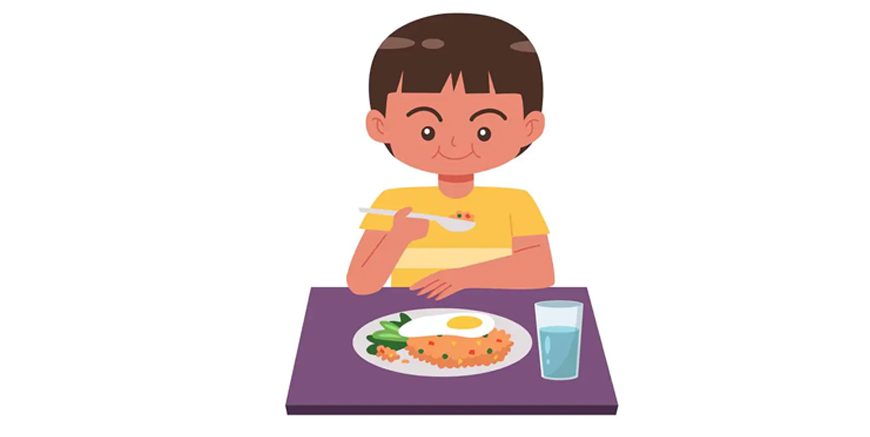As parents, ensuring that your child has a healthy appetite is important for their overall growth and development. While it’s common for children to go through phases of fussy eating, there are effective ways to help stimulate their hunger and encourage them to eat nutritious meals. By understanding the causes behind a low appetite and implementing simple strategies to naturally boost it, you can create a positive eating routine for your child. Let’s explore the reasons why kids may experience low appetite and how you can support them in building healthy eating habits.
What causes low appetite in children?
Children often lose their appetite when they are sick, but there are other causes too.
- Emotional problems such as anxiety and stress can impact your child’s desire to eat. These issues can cause a decrease in appetite, as stress hormones may disrupt hunger cues, resulting in a lack of interest in food and potential nutritional deficiencies.
- Growth spurts can also have significant impact on the appetite fluctuations are common during in children. These temporary decreases in appetite are a normal part of development and typically resolve as their bodies adapt to increased growth requirements.
- Inconsistent meal schedules or selective eating habits can impact children’s nutrition, making it difficult to provide them with a well-rounded diet. This inconsistency may hinder their overall health and development.
- Food allergies and digestive issues have the potential to affect one’s appetite. These conditions may result in discomfort and pain, ultimately reducing the urge to eat. It is essential to make necessary dietary changes to address these issues in order to sustain a balanced and healthy appetite.
- Inactivity has the potential to decrease feelings of hunger. Engaging in physical activity typically increases appetite, making it important to avoid being sedentary in order to maintain a healthy level of hunger. Promoting regular exercise can support a robust appetite and encourage children to consume nutritious meals.
- The atmosphere at home and the routine of meal times can have a direct effect on one’s appetite. A nurturing and calm home environment with regular meal schedules can greatly influence a child’s desire to eat. Establishing a welcoming setting during meals promotes healthier eating behaviors and a stable appetite.
- Taste preferences play a key role in influencing children’s food choices. This leads to selective eating habits. Introducing a variety of foods gradually can help broaden their palate and ensure they get a wide range of nutrients.
- Changes in daily schedule can impact eating behaviors. Major shifts in a child’s daily routine, like beginning school or relocating to a new residence, can disturb their eating habits. Maintaining meal schedules and food selections can assist in lessening these disturbances and promoting a steady appetite.
Tips To Improve Kids’ Appetite
Parents are always struggling with their kids’ appetite and wondering what they did wrong that their child is such a picky eater. They may completely refuse to eat the foods that you know are healthy for them and there’s no way you can force them to eat what they don’t like. As this is the age when their body is going through maximum growth and development, it is vital to ensure that their body gets all the nutrients in adequate quantities. There are a few tricks on how to increase hunger in child naturally and to get them to eat nutritious food especially if they are always looking for ways to skip their meals.Try them out to increase your child’s appetite and make them eat healthier.
1. Make Them Drink Water Regularly
Start your child’s day with a glass of water as drinking water first thing in the morning helps to improve digestion by hydrating their body. In addition, make them drink water half an hour before they eat their meals as it helps to stimulate their appetite. Insist on them having water in between meals rather than juices or milk as this fills them up and causes lack of appetite in a child. Water activates the digestive enzymes and juices which not only increase appetite and also boost digestion.
2. Give A Snack Every Two Hours
Children are very active and need all the energy for their activities throughout the day. Your child may be a fussy eater just because they are not feeling hungry. Try feeding them small food portions every 2 hours. Rather than 3 regular meals, give them light snacks such as fruits or nuts between meals as that will help to boost their appetite and provide them with essential nutrients.
3. Never Skip Breakfast
Starting your kid’s day with a healthy and sumptuous breakfast improves their appetite, kickstarts their metabolism and helps them be more active throughout the day. Never skip breakfast as it sets the tone for the day.
4. Include Zinc In Diet
Including zinc in your child’s diet helps to stimulate their appetite. Nuts like cashews, dairy products, pumpkin seeds, beans, spinach and mushrooms are rich in zinc so try including them in your child’s snacks or meals. Peanuts in the form of peanut butter or roasted peanuts not only boost their appetite but are also rich in protein. Zinc is essential for boosting immunity and other physiological functions and a mild deficiency can cause loss of appetite, weight loss, diarrhoea and susceptibility to infections.
5. Include Desserts In Their Meals
Fruit-based desserts with apples and strawberries can entice kids to finish their meals and also help to stimulate their appetite, aid digestion and improve metabolism. Yoghurt is also a good alternative as it boosts appetite and contains calcium and healthy prebiotics which help strengthen your child’s immune system. A smoothie is also a good way to get your child to eat healthy fruits and vegetables without even realising.
6. Stimulate Their Appetite
Start with small bites of food as it boosts appetite by building metabolism. Increase the variety of foods in their diet. Children may not be willing to try out new textures and tastes in food but you can start by giving your child nutritious meals that they like or are familiar with. Children are more likely to eat more if served their favourite foods and you can slowly incorporate new foods. Avoid keeping snacks readily available to your child as they could be snacking on food throughout the day, leaving them with little appetite for regular meals. It’s better to feed your child at scheduled times every 2 to 3 hours as this helps your child to develop their hunger signals at meal times.
7. Physical Activity
By burning energy while running and playing, your child will eat better during regular meal times. If kids spend more time on their screens rather than outdoor activities, they won’t have much of an appetite. Such sedentary activities burn few calories and your child as a result may not be hungry. Introduce new sports like cycling or swimming or take them for a walk as that will boost their appetite and help to develop their physique and coordination skills.
8. Check Their Iron Levels
Your child’s appetite might reduce if their iron levels are low. Some studies indicate that one in eight toddlers tend to be anaemic before the age of 2 years. Kids younger than 9 years need approximately 7 to 10 milligrams of iron every day and you can include iron rich foods like eggs, spinach and lentils in their diet. Pair these foods with Vitamin C as it helps in the absorption of iron.
9. Mindfulness
Many kids don’t notice that they are hungry, so it’s good to talk to them about if their stomach feels empty or full as it helps them to start making that connection. If they are not sure what to answer and if you know they haven’t eaten for a while, you can tell them that their stomach is empty.
10. Exploration
Many kids who have a poor appetite may not have had many positive experiences with food or may not have interacted with it very much. That’s why you should allow them to play with and explore food. It may get them interested in eating and more used to new and different foods. You can set up cooking activities that your child can help with. Sensory bins can be used for them to play with noodles, rice and other foods.
Conclusion
Most children will benefit from these tips on how to increase appetite in a child naturally, and you will notice the difference over time. It may not always be easy, but being consistent and persistent is definitely going to show results. Patience and regular efforts are key to seeing positive changes. The causes of loss of appetite in a child may sometimes require medical attention, so if nothing works, it’s a good idea to consult a pediatrician. A healthcare professional can provide tailored advice and identify any underlying issues.
If you want more insight on how to improve your child’s appetite and get them interested in different kinds of food, you should touch base with EuroKids. We offer valuable resources and support for parents looking to enhance their child’s eating habits and overall nutrition.
















